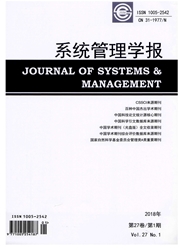

 中文摘要:
中文摘要:
基于消费者效用理论,考虑作为供应链领导者的制造商在传统零售渠道的基础上引入直销网络渠道,2个渠道都为消费者提供信息服务,2种渠道的信息服务是互补的,并且具有溢出效应。研究基于信息服务的双向搭便车行为对供应链各方的定价、服务水平、市场份额和利润的影响,探讨制造商愿意引进直销网络渠道的条件。研究结果表明:当直销网络渠道的服务成本系数较小时,制造商的最优策略是采用双渠道来销售产品;当直销网络渠道的服务成本系数较大时,直销网络渠道只提供信息服务,市场需求为零,制造商提供信息服务故意让零售商搭便车。制造商引入直销网络渠道可以扩大总市场需求,制造商的利润总是增大的;并且在制造商故意让零售商搭便车的情况下,供应链双方利润都得到改善。
 英文摘要:
英文摘要:
Based on the consumer utility theory, we study a supply chain where the manufacturer adds a direct Internet channel together with the traditional channel. We assume that both channels provide information services for consumers, and these information services are complementary and have spill over effect. The effects of bidirectional free-riding on the pricing, service level, market demand and profits of both partners are analyzed, and the condition that the manufacturer is willing to add the direct internet channel is explored. The findings show that if the coefficient of service cost of the direct Internet channel is relatively low, then the bidirectional free-riding occurs; and if the coefficient of service cost of the direct Internet channel is relatively high, the manufacturer purposely induces free riding by providing information services to allow retailer to enjoy a free ride. Furthermore, with the adding of the direct channel, the total market demand is enlarged and the manufacturer is always profitable. When the manufacturer purposely allow retailer to enjoy a free ride, the profits of both the manufacturer and retailer are improved.
 同期刊论文项目
同期刊论文项目
 同项目期刊论文
同项目期刊论文
 Channel selection in asupply chain with a multi-channel retailer: The role of channel operating cost
Channel selection in asupply chain with a multi-channel retailer: The role of channel operating cost The role of rebates in the hybrid competition between a national brand and a private label with pres
The role of rebates in the hybrid competition between a national brand and a private label with pres Single machine scheduling with general time-dependent deterioration, position-dependent learning and
Single machine scheduling with general time-dependent deterioration, position-dependent learning and Developing green purchasing relationships for the manufacturing industry: An evolutionary game theor
Developing green purchasing relationships for the manufacturing industry: An evolutionary game theor Single-machine common flow allowance scheduling with job-dependent aging effects and a deteriorating
Single-machine common flow allowance scheduling with job-dependent aging effects and a deteriorating 期刊信息
期刊信息
